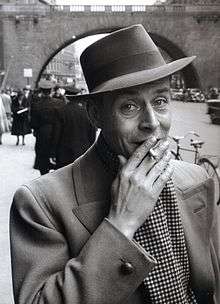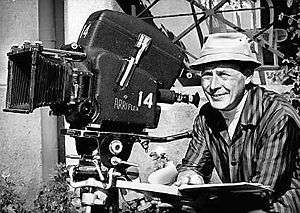Hasse Ekman
Hasse Ekman (10 September 1915 – 15 February 2004) was a Swedish director, actor, writer and producer for film, stage[1] and television.
Hasse Ekman | |
|---|---|
 Hasse Ekman in 1953. | |
| Born | Hans Gösta Ekman 10 September 1915 Stockholm, Sweden |
| Died | 15 February 2004 (aged 88) |
| Nationality | Swedish |
| Occupation | Actor, director, writer, producer |
| Years active | 1924–1964 |
| Spouse(s) | Agneta Wrangel
( m. 1938–1944)Eva Henning
( m. 1946–1953)Tutta Rolf
( m. 1953–1972)Viveca Trädgårdh
( m. 1974–2004) |
| Children | Gösta, Krister, Mikael, Stefan, Fam |
| Parent(s) | Gösta Ekman Greta Ekman |
Biography
Hasse Ekman is probably Sweden's most successful and critically acclaimed film director from the period after Sjöström and Stiller and prior to Ingmar Bergman, peaking between the mid-1940s and 1950. He was greatly influenced by filmmaker Orson Welles and also by episodic-films. His most successful film as a director is often said to be the 1950 film Flicka och hyacinter (Girl with Hyacinths), a crime/mystery drama about a young woman committing suicide by hanging herself in her apartment. His 1957 film Summer Place Wanted was entered into the 1st Moscow International Film Festival.[2]
Hasse Ekman is part of the prominent "Ekman acting family" in Sweden: He was the son of Swedish star actor Gösta Ekman (senior) and father of actor Gösta Ekman (junior), actor Stefan Ekman and stage/film director Mikael Ekman. He is the grandfather of actress Sanna Ekman.[3]
As an actor Ekman appeared in most of his own films, as the leading man and in a number of strong supporting roles, and he also acted in three early Ingmar Bergman films (Prison, Thirst and Sawdust and Tinsel). He also played opposite his famous father in Intermezzo, the original Swedish 1936 film starring Ingrid Bergman as the female lead. Overall he appeared in fifty Swedish films.
Selected director filmography
- 1965 – Niklasons (TV-series)
- 1964 – Äktenskapsbrottaren
- 1963 – Min kära är en ros (My Love Is Like a Rose)
- 1961 – Rififi in Stockholm
- 1960 – Kärlekens decimaler
- 1960 – På en bänk i en park
- 1959 – Himmel och pannkaka (Heaven and Pancake)
- 1959 – Fröken Chic
- 1958 – Jazzgossen
- 1957 – Med glorian på sned
- 1957 – Summer Place Wanted
- 1956 – Seventh Heaven
- 1956 – Egen ingång
- 1956 – Ratataa
- 1954 – Gabrielle
- 1953 – We Three Debutantes
- 1952 – The Firebird
- 1951 – The Nuthouse
- 1950 – Hjärter Knekt
- 1950 – The White Cat
- 1950 – Flicka och hyacinter (Girl with Hyacinths)
- 1949 – Flickan från tredje raden (The Girl from the Third Row)
- 1948 – Banketten (The Banquet)
- 1948 – Lilla Märta kommer tillbaka (Little Martin Returns)
 Hasse Ekman on set during filming, 1963
Hasse Ekman on set during filming, 1963 - 1948 – Each to His Own Way
- 1947 – One Swallow Does Not Make a Summer (En fluga gör ingen sommar)
- 1946 – Medan porten var stängd (While the Door Was Locked)
- 1946 – Meeting in the Night
- 1945 – Fram för lilla Märta
- 1945 – Vandring med månen (Wandering with the Moon)
- 1945 – Kungliga patrasket (The Royal Rabble)
- 1944 – Excellensen
- 1944 – Som folk är mest
- 1943 – Ombyte av tåg
- 1942 – Lyckan kommer
- 1942 – Flames in the Dark
- 1941 – Första divisionen
- 1940 – Med dej i mina armar
Selected screenwriting
- 1959 – Fröken Chic
- 1958 – Jazzgossen
- 1958 – You Are My Adventure
- 1957 – Med glorian på sned
- 1956 – Seventh Heaven
- 1956 – Egen ingång
- 1956 – Ratataa
- 1953 – Resan till dej
- 1950 – Flicka och hyacinter (Girl with Hyacinths)
- 1949 – Flickan från tredje raden (The Girl from the Third Row)
- 1948 – Banketten ("The Banquet")
- 1948 – Each to His Own Way
- 1948 – Love Goes Up and Down
- 1946 – Medan porten var stängd (While the Door Was Locked)
- 1945 – Kungliga patrasket (The Royal Rabble)
- 1945 – Fram för lilla Märta
- 1943 – Ombyte av tåg
- 1941 – Magistrarna på sommarlov
- 1940 – Swing it, magistern!
- 1938 – Thunder and Lightning
Selected actor filmography
- 1960 – På en bänk i en park
- 1959 – Fröken Chic
- 1958 – Jazzgossen
- 1957 – Med glorian på sned
- 1956 – Seventh Heaven
- 1956 – Egen ingång
- 1956 – Ratataa
- 1954 – Gabrielle
- 1953 – Glasberget
- 1953 – Sawdust and Tinsel
- 1950 – Hjärter Knekt
- 1949 – Flickan från tredje raden (The Girl from the Third Row)
- 1948 – Banketten ("The Banquet")
- 1948 – Lilla Märta kommer tillbaka
- 1946 – While the Door Was Locked
- 1946 – Meeting in the Night
- 1945 – Fram för lilla Märta
- 1945 – Vandring med månen (Wandering with the Moon)
- 1945 – Kungliga patrasket (The Royal Rabble)
- 1944 – Stopp! Tänk på något annat
- 1943 – Ombyte av tåg
- 1942 – Flames in the Dark
- 1941 – Första divisionen
- 1941 - Life Goes On'
- 1940 – Juninatten
- 1938 – Thunder and Lightning
- 1936 – Intermezzo
Bibliography
- Hur ska det gå med mej?, Hasse Ekman, Stockholm: Hökerberg, 1933.
- Gösta Ekman, Hasse Ekman, Stockholm: Bonnier, 1938.
- Den vackra ankungen, Hasse Ekman, Stockholm: Wahlström & Widstrand, 1955.
- Kurre Korint och drömfabriken: en djupt osannfärdig berättelse från filmens underbara värld, Hasse Ekman, Stockholm: Wahlström & Widstrand, 1956.
References
- Manstad, Margit (1987). "Och vinden viskade så förtroligt". Stockholm: Läsförlaget AB. p. 180. ISBN 91-7902-067-4. SELIBR 7673797. Missing or empty
|url=(help) - "1st Moscow International Film Festival (1959)". MIFF. Archived from the original on 2013-01-16. Retrieved 2012-10-30.
- Hitta graven
| Wikimedia Commons has media related to Hasse Ekman. |